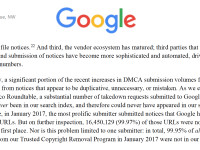The U.S. DMCA notice-and-takedown system has generated heated debate for many years with supporters arguing that the safe harbour is essential, while rights holder critics countering that the growing number of takedown notices sent to Google illustrates mounting piracy concerns. In recent months, there have been several reports that raise questions about the reliability of takedown notices. A study released last year by the University of California, Berkeley and Columbia University found that approximately 30% of notices were questionable, while TorrentFreak report this week identified tens of millions of fake DMCA takedown notices sent to Google on a website with virtually no traffic. An earlier report also raised questions about dubious takedown practices.
Yet those reports pale in comparison to data just released by Google in its submission to the Register of Copyrights as part of the review of the DMCA notice-and-takedown system. Google reports that the overwhelming majority of takedown notices sent to Google Search through its Trusted Copyright Removal Program do not involve pages that are actually in its search index. The submission states:











